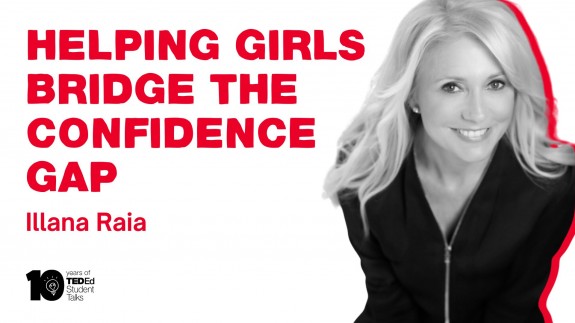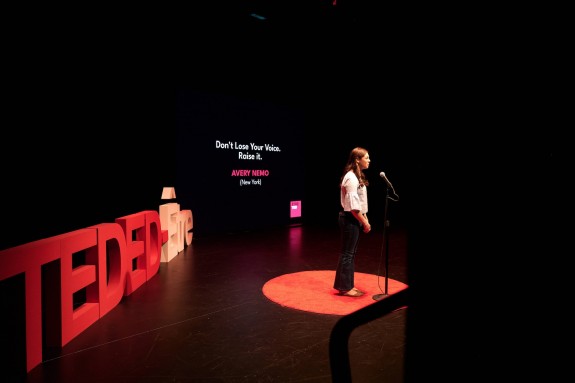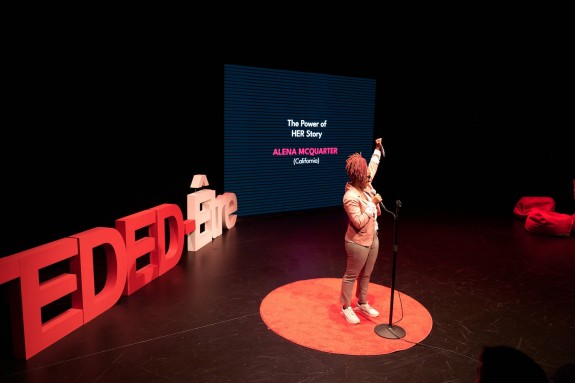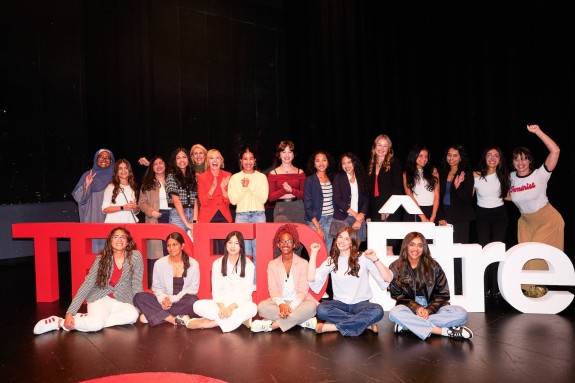Helping girls bridge the confidence gap: A conversation with Illana Raia
By TED-Ed on December 17, 2024 in News + Updates

Xixi Wang
Since 2014, thousands of student groups across the globe have been developing and sharing their ideas using our free TED-Ed Student Talks resources. To celebrate 10 years of TED-Ed Student Talks, we have been collecting stories of impact from the program’s facilitators as part of our “10 for 10 years” series.
For this installment of the series, we are highlighting Illana Raia, an entrepreneur who founded ÊTRE, an organization which connects girls with mentors across dozens of industries, and has integrated the Student Talks program into ÊTRE for the past four years.
Here, she speaks with TED-Ed’s Programs Manager Sasha Rudenko about her thoughts on how the program fits into the mission of ÊTRE and how it has helped girls bridge the middle school confidence gap:
Sasha Rudenko (SR): Tell us about ÊTRE, what the organization is, your role, and what students you serve.
Illana Raia (IR): We take girls directly into companies that they are interested in and meet female leaders face-to-face. It’s very girl-driven. We go into companies like Spotify and Google, we ring the bell at NASDAQ and we meet the women who work there. And we do this because, as our research from 2024 confirmed, girls’ confidence between ages 13 and 18 is dropping by 20%. But 91% of girls said that higher confidence is directly related to mentorship. So a big part of what we do— whether it is through company visits, books, or TED-Ed— is we bring girls into close proximity with amazing mentors so that their voices can be heard and their ideas can be explored in a bigger way earlier on.

Avery Nemo
SR: How did you find the TED-Ed Student Talks program? How did you implement it into what you were already doing with ÊTRE?
IR: A lot of the things that were defining girls, particularly in high school, particularly looking at college, suddenly went up in smoke [at the start of the COVID-19 pandemic], right? There’s no varsity soccer season. There’s no school newspaper. There’s no spring musical. From middle school all the way through high school, girls were losing the thing that excited them at school. And they were looking for ways to define themselves. I knew about TED-Ed and I reached out and I said, “Look, I’m not one school, but I work with a ton of schools.” I asked if it would be possible for me to get a license so that girls could continue to explore the things that they were closest to outside of school and we can work on the mentorship side. And TED-Ed said yes.
“Connection and community were key for girls at the [beginning of the pandemic], and TED-Ed unlocked their world.”
2021 was our first year and it was such a game-changer for our girls because they suddenly found that thing that they couldn’t do at school. They could talk to other founders and let the world know what their idea was. It gave them a different springboard at a time when everyone was so isolated and it immediately gave them a larger community. We pair each girl with a particular mentor and encourage the girls to think really big. The mentors we’ve had have been incredible. We had a 10-year-old from Canada write about protecting the environment and four women from the Jane Goodall Institute gave her suggestions, quotes, and talked to her about what her premise was. I don’t know that that would have happened before [the start of COVID]. They give the girls a little extra confidence to be able to get up and share their own idea because they bounced it off someone who’s already an expert.
SR: If you were to pick a standout moment from your time leading the group, what would you highlight?
IR: I’m going to give you two. First, from the mentorship side, something that really thrilled me is how the girls who have been through the program are now mentoring each other. We’ve got three girls, all under 16, mentoring each other within the Student Talks program. That completely surprised me.
Second, from a facilitator point of view, watching girls, from the rehearsal day to the performance day, come into their own. [A lot of] these girls have never been brave enough to try out for choir, or debate team, or anything else that involves getting on a stage. They might be shy or they’re nervous about their braces. And then they stand on that carpet and step up to that mic and it’s like someone flips a switch. There’s a different kind of confidence that comes because they’re talking about something they chose. They weren’t assigned this. They’ve been thinking about it for six months. They did all the writing. TED-Ed is special because it’s so student-driven. And that I’ll take that type of confidence all day.
“It’s not the ultimate grasping of the mic that raises their voices — it’s support from fellow speakers, the encouragement of epic mentors, and the step-by-step process that TED-Ed lays out that helps them find their voice.”
SR: Aside from confidence, if you were to pick skills — soft and hard skills — that you’ve seen your students improve the most by going through the Student Talks activities, what would those be?
IR: TED-Ed lets them take on a really big topic. [Whether it’s] entrepreneurship or grief or climate change or cultural norms in their country, it’s different from a regular assignment than they’re used to. The expansiveness of thought is really great with this program— it lets them think big.
I love the feedback they give each other, especially in the beginning when we’re in those group settings before we’re rehearsing individual talks. They don’t know each other and yet they are really willing to listen. If you tell most people that middle school girls are going to be immediately collaborative and supportive, most people are going to roll their eyes. I only see that with TED-Ed. It affords a lot of collaboration and peer support, which is nice outside of your own school system.
The girls always surprise me with how well they do [with the activities] in the very beginning. They write beautifully. And I don’t know if that’s the girls who are drawn to TED-Ed or if it’s just that blue sky, say whatever you want aspect of it, which is different than regular homework.

Alena McQuarter
SR: Think about somebody who wants to start this in their school: what would you tell them? What has been the most challenging part about implementing Student Talks at ÊTRE and how did you overcome it?
IR: For the first three years when we were only virtual, girls were busy. Making sure we could get everyone was hard. And so one thing I did every month was offering at least three meeting choices for each time zone. You can jump into any one of the [meetings], and they knew that they had to be in a meeting every month. If someone couldn’t make any of them, I made sure that I could meet one-on-one with her. If you’re facilitating the program for a lot of different schools and [trying to accommodate] everyone’s schedules, offer way more options than you think you’ll need.
Another challenge was that I was worried they were going to be really intimidated being on stage. We had a rehearsal day, and one thing we did was we put a bunch of red bean bags in one corner of the stage and divided the girls into groups of five. So when they first got to the stage, they were with a group. They all got on the stage together and then one by one they’d get called to the mic. Adding that little intermediate step getting to the stage I thought was helpful because this may be the first time a girl has ever been on a big stage. And it’s a big theater and there are lights and it’s intimidating. I would tell someone who’s starting it, if you see that [nervousness] at all, have them go up on stage in teams. Then at least they’re sitting among their peers, and they’re getting a few minutes on stage to look out at the audience before they’re up at the mic and they get more comfortable.
“That middle school confidence gap? I have witnessed TED-Ed bridge that gap again and again.”
SR: You’ve been doing this for four years. What tips or words of wisdom would you share with someone considering Student Talks for their students?
IR: I would say first of all, do it! It’s going to seem like a giant thing. It’s going to seem like there are so many requirements and it’s overwhelming. Do it. Anytime I had a question and I emailed anybody at TED-Ed, I got the information. That was really great.
I think the students have to really want to do it. If a parent comes to you and assures you that this child— who’s not saying one word— really wants to do it, the kids have to really want it. And those are the best talks. It’s a really enriching thing to add to your program, whatever your program might be.

Speakers at the ÊTRE talk showcase
Interested in learning more about TED-Ed Student Talks? Check out our Student Talks page here to find out how the program works and how you can get involved.
Check out the other pieces in the 10 for 10 years series here and here.
Tags: TED-Ed Student Talks, Student Talks Program, Student Voice